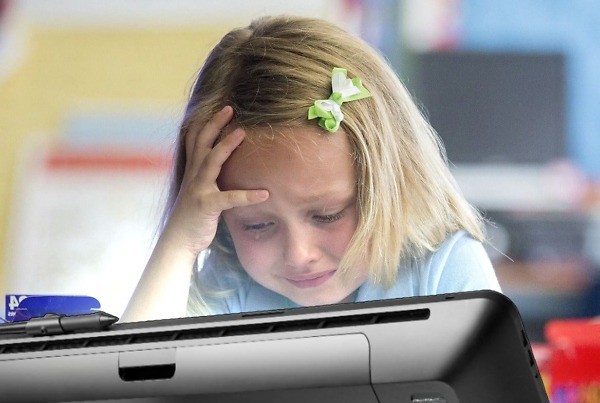
From Pixels to Paper
Webcomics have been a digital staple since the mid-90s. Recently these digital-exclusive comics have gained vast popularity in the print industry, sparking interest in securing print rights for webcomic intellectual property among creators and publishers. The race is on to secure print rights for numerous comic IPs, and that’s where my webtoon, Let’s Play, enters the story.
Webtoon comics use infinite scrolling for those unfamiliar, perfect for mobile devices. But the format isn’t print-friendly, where panels are expected to be grouped on each page. When Rocketship Entertainment approached me to transform my webtoon into print, I hesitated, thinking, “I don’t have time to reformat Let’s Play for print.” Rocketship CEO Tom Akel offered to hire someone to do the formatting, and I was intrigued. But would people buy a book they could read online for free?
As we prepared for the Kickstarter campaign to bring Let’s Play to print, we planned variant covers, prints, plushies, and more. With a $10,000 goal, we felt confident that would be enough to get production rolling. Imagine our surprise when the first Rocketship Entertainment Kickstarter for Let’s Play Volume 1 raised an astonishing $233,750! Since then, several webtoon comics have been adapted into print books and seen tremendous success.
It’s not uncommon for a rapidly growing industry, such as webtoon comic print publishing, to experience a lack of widely known standards and expectations. This can make it challenging for comic creators to navigate the field and understand what constitutes a fair deal. In this article, I aim to shed light on the industry and provide valuable information on the standard practices and fair agreements in webtoon comic print publishing.
General Guidelines
First, determine if you still possess your print publishing rights. Some comic platforms have begun including print rights in their contracts without explicitly informing creators. Always consult an attorney before agreeing to any contracts to avoid unknowingly signing away these rights.
Secondly, if you’re considering a print publishing deal, it’s crucial to determine whether it’s a good or bad offer. To help you make an informed decision, I’ve conducted extensive research and gathered key information for your comparison. This should provide valuable insight into the offer you’re evaluating.
Compensation and Your Share as the Creator
The amount an author earns from the sale of their books can vary greatly depending on several factors, such as the publishing model, the type of book, the author’s contract with the publisher, and the book’s success in the market.
Typically, authors receive royalties as a percentage of the book’s cover price (for print books) or net revenue (for ebooks). Royalty rates vary, but here are some general guidelines:
Hardcover Books
7.5% to 15% per book sold
Hardcover graphic novels can range from about $20 to $40 or more depending on factors like size and length, as well as the prestige of the author or artist.
Paperback Books
6% to 10% per book sold
Graphic novels in paperback format can range from around $10 to $25, depending on the size and length of the book.
eBooks
25% to 50% of net revenue
Digital graphic novels, such as those available on e-readers or through platforms like ComiXology, can range from $5 to $30 or more. Digital editions may sometimes be priced lower than their physical counterparts due to the absence of printing and shipping costs.
Simply put, you can expect to earn 7.5 to 15% of the cover price for hardcover books sold and 6 to 10% for paperback books sold. And 25 to 50% of the net revenue from ebooks sold.
It should be emphasized that an author’s earnings are not solely based on royalty percentages. Factors like marketing, distribution, and the overall popularity of the book can significantly impact the number of books sold and, therefore, the author’s earnings.
Additionally, authors might receive an advance against royalties when signing a book contract with a traditional publisher. This advance is an upfront payment the author receives before publishing the book. The advance is later recouped from the author’s royalties, meaning the author doesn’t earn additional royalties until the advance has been earned back through book sales. For example, you receive an advance of $15,000 for your book. You receive this amount upfront, but you won’t earn any further money from book sales until the publisher has recovered the $15,000 they paid you in advance.
In summary, the amount an author earns from selling their books depends on various factors, including the publishing model, the type of book, the royalty rates in their contract, and the success of their book in the market.
Publisher May Ask for Part of the Intellectual Property (IP)
It is important to note that some companies expect a percentage of intellectual property (IP) ownership as part of their publishing agreements. However, numerous other companies publish graphic novels without requesting IP ownership. To protect your interests, having any contracts reviewed by a qualified attorney before signing is crucial, ensuring that you retain the rights and IP ownership you desire.
What Is My Current Print Deal?
I previously mentioned that my webtoon comic, Let’s Play, is published in print by Rocketship Entertainment. They have allowed me to disclose the terms of our agreement. I earn 50% of the net profit from my comic’s print sales. Notably, receiving 50% of the net profit is more common among comic publishers than book publishers.
All Print Sales
50% of net profit
“50% of net profit from book sales” means that the person receiving this percentage will get half of the net profit generated from the sales of a book. Net profit refers to the money earned from selling the book after all expenses, such as production costs, marketing, distribution, and taxes, have been subtracted from the gross revenue.
For example, if a book generates $10,000 in gross revenue and the associated expenses total $6,000, the net profit would be $4,000. In this case, 50% of the net profit would be $2,000, which is the amount that would be paid to the individual or entity entitled to receive it.
Importantly, Rocketship Entertainment does not claim ownership of any of my intellectual property. Many comic publishers offer 50% of the net profit from print sales but also ask for IP ownership in return.
Navigating the Path from Digital to Print Publishing
In conclusion, the transition from pixels to paper for webcomics has opened a new world of opportunities for creators and publishers alike. The success of webtoon comics in print has proven that readers are willing to support their favorite stories both digitally and physically. As the industry grows, creators must know the standard practices and fair agreements in webtoon comic print publishing. By understanding their rights, compensation, and the value of their intellectual property, creators can make informed decisions and forge partnerships that help bring their stories to a broader audience. As we move forward in this exciting era of webcomics, the possibilities are endless, and the love for stories that once lived only on screens will continue to find new homes on the printed page.
List of Notable Comic Book Publishers
Rocketship Entertainment: Established in 2019, Rocketship Entertainment is a publishing, consumer product, and entertainment company that focuses on producing definitive, premium editions of graphic novels and comics, along with a full array of merchandise. They work closely with creators and connect fans directly to the series they want. Rocketship Entertainment has multiple Eisner-nominated and Ringo award-winning series to its name. Their first book, Let’s Play Volume 1, was successfully funded through a Kickstarter campaign in April 2019.
Image Comics: Founded in 1992 by high-profile comic book artists, Image Comics is an American comic book publisher known for creator-owned titles such as Spawn, The Walking Dead, and Saga. Image operates with a creator-friendly model, allowing creators to retain the rights to their work.
Dark Horse Comics: Founded in 1986, Dark Horse Comics is an American publisher that produces a mix of licensed properties, creator-owned titles, and translated foreign material. Some notable titles include Hellboy, Sin City, and the comic adaptations of the Star Wars franchise.
IDW Publishing: Established in 1999, IDW Publishing is an American publisher producing licensed properties and creator-owned titles. Some of their popular titles include Transformers, Teenage Mutant Ninja Turtles, and Locke & Key.
BOOM! Studios: Founded in 2005, BOOM! Studios is an American publisher focusing on a diverse range of original series and licensed properties, including Lumberjanes, Mouse Guard, and Power Rangers.
Yen Press: An American manga and graphic novel publisher founded in 2006 as a joint venture between the Hachette Book Group and the Japanese publisher Kadokawa Corporation. Yen Press primarily focuses on publishing manga, light novels, and Japanese literature in English, catering to the growing demand for Japanese pop culture in the English-speaking market. Some popular titles they’ve published include Black Butler, Death Note, The Melancholy of Haruhi Suzumiya, Sword Art Online, and Puella Magi Madoka Magica.
VIZ Media: Founded in 1986, VIZ Media is a major American publisher of manga, anime, and related merchandise. They are known for publishing popular manga series in English, such as Naruto, One Piece, Dragon Ball, My Hero Academia, and Tokyo Ghoul. VIZ Media also releases graphic novels, art books, and other related content
Dynamite Entertainment: Established in 2004, Dynamite Entertainment is an American publisher known for its licensed properties, including James Bond, Red Sonja, and The Shadow, as well as creator-owned titles like Vampirella.
Aftershock Comics: Launched in 2015, Aftershock Comics is an American publisher focusing on creator-owned titles and attracting top-tier talent from the comic book industry.
Top Shelf Productions: A publisher of independent and creator-owned graphic novels, Top Shelf Productions is known for titles like Essex County, From Hell, and March.
Oni Press: An independent publisher of creator-owned comics and graphic novels, Oni Press has published popular titles like Scott Pilgrim by Bryan Lee O’Malley, The Sixth Gun by Cullen Bunn and Brian Hurtt, and Stumptown by Greg Rucka and Matthew Southworth.
NBM Publishing: Established in 1976, NBM is one of the oldest graphic novel publishers in the U.S. and has released graphic novels like The Silent Invasion by Michael Cherkas and Larry Hancock and The Louvre Collection series featuring various creators.
Black Mask Studios: Established in 2012, Black Mask Studios is an indie publisher focused on creator-owned titles with unique voices and innovative storytelling. They’ve published graphic novels like Space Riders by Fabian Rangel Jr. and Alexis Ziritt and 4 Kids Walk Into a Bank by Matthew Rosenberg and Tyler Boss.
TKO Studios: Founded in 2018, TKO Studios is an independent publisher that releases entire comic series as collected editions or graphic novels. Some of their titles include Sara by Garth Ennis and Steve Epting, Sentient by Jeff Lemire and Gabriel Walta, and The Banks by Roxane Gay and Ming Doyle.
Iron Circus Comics: Founded by cartoonist C. Spike Trotman, Iron Circus Comics is a Chicago-based publisher that produces diverse, creator-owned graphic novels, anthologies, and art books. Some of their titles include Smut Peddler, a collection of sex-positive comics, and The Girl Who Married a Skull by Kel McDonald and Kate Ashwin.
Uncivilized Books: This independent publisher focuses on alternative and literary graphic novels, comics, and art books. They have published works like Houses of the Holy by Caitlin Skaalrud and The Chronicles of Fortune by Coco Picard.
Avery Hill Publishing: While not based in the United States, this British publisher is in the U.S. market, focusing on small press and independent comics and graphic novels. They have published titles like The End of Summer by Tillie Walden and Follow Me In by Katriona Chapman.








